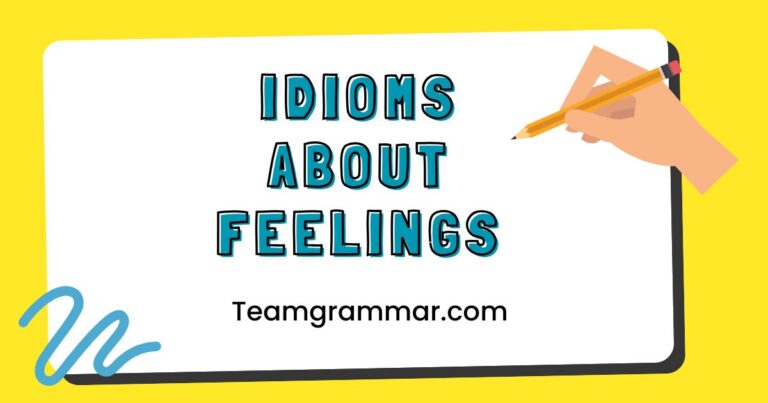47 Idioms for Dead: Mastering Figurative Language in English
Idioms are a crucial part of the English language, adding color, depth, and nuance to communication. Understanding idioms related to death is particularly important, as they often appear in everyday conversations, literature, and media.
This article provides a comprehensive guide to these idioms, exploring their meanings, origins, and proper usage. Whether you’re an English language learner or a native speaker looking to refine your understanding, this guide will equip you with the knowledge to confidently interpret and use these expressions.
Table of Contents
- Introduction
- Definition of Idioms for Dead
- Structural Breakdown
- Types and Categories of Idioms for Dead
- Examples of Idioms for Dead
- Usage Rules for Idioms for Dead
- Common Mistakes When Using Idioms for Dead
- Practice Exercises
- Advanced Topics
- FAQ
- Conclusion
Introduction
Idioms are expressions whose meanings cannot be understood from the literal definitions of the individual words. They are figurative language elements that provide a unique and often colorful way to convey complex ideas or emotions.
Idioms related to death, in particular, can be sensitive and require careful understanding to use appropriately. These idioms often arise from historical contexts, cultural beliefs, or metaphorical associations with the concept of death.
Mastering idioms for “dead” can significantly enhance your comprehension of spoken and written English. This knowledge allows you to grasp the intended meaning behind figurative language, improving both your communication and understanding.
This guide is designed for English language learners, students, and anyone interested in expanding their knowledge of English idioms.
Definition of Idioms for Dead
An idiom related to “dead” is a phrase or expression where the overall meaning refers to being deceased, non-functional, obsolete, or in a state of inactivity. These idioms often employ metaphorical language to soften the harshness of the word “dead” or to provide a more nuanced description of a state of being.
They can describe physical death, the end of a project, or the failure of a plan.
Classification and Function
Idioms for “dead” can be classified into several categories based on the specific meaning they convey. Some idioms directly refer to physical death, while others describe a state of being unproductive or useless.
The function of these idioms is to add color and depth to language, allowing speakers to convey emotions and ideas in a more evocative way. They often reflect cultural attitudes toward death and loss.
Contexts of Use
The contexts in which idioms for “dead” are used vary widely. Some idioms are appropriate for formal settings, while others are more suitable for casual conversations.
The tone and register of the idiom should always match the situation. It is essential to be mindful of the potential sensitivity surrounding the topic of death and to use these idioms with care and respect.
Structural Breakdown
The structure of idioms for “dead” can vary significantly. Some idioms are simple phrases consisting of a few words, while others are more complex sentences.
Understanding the structural elements of these idioms can help in deciphering their meaning and usage.
Common Components
Many idioms for “dead” include verbs, nouns, and adjectives that contribute to their figurative meaning. Verbs like “kick,” “bite,” and “push” are often used metaphorically to describe the act of dying.
Nouns like “bucket,” “dust,” and “grave” provide symbolic associations with death. Adjectives like “dead,” “gone,” and “passed” indicate a state of being deceased or non-functional.
Patterns and Rules
While idioms are not governed by strict grammatical rules, they often follow certain patterns. For example, many idioms use metaphorical language to create a vivid image or convey a specific emotion.
The order of words in an idiom is generally fixed, and changing the order can alter the meaning or render the idiom nonsensical. It’s important to learn these patterns through exposure and practice.
Types and Categories of Idioms for Dead
Idioms for “dead” can be categorized based on their specific meaning and usage. Here are some common types:
Direct References to Death
These idioms explicitly refer to the act of dying or being deceased. They often use euphemisms to soften the harshness of the word “dead.” Examples include “kick the bucket,” “pass away,” and “bite the dust.”
Metaphorical Expressions of Inactivity
These idioms describe a state of being unproductive, useless, or obsolete. They often use imagery related to death or decay to convey the idea of something being lifeless or non-functional.
Examples include “dead in the water,” “dead and buried,” and “dead duck.”
Figurative Descriptions of Failure
These idioms describe the failure of a plan, project, or endeavor. They often use metaphors of death or destruction to emphasize the finality of the failure.
Examples include “dead on arrival,” “stillborn,” and “a dead loss.”
Euphemistic Expressions
These idioms are used to soften the impact of directly mentioning death. They are frequently used in formal or sensitive contexts to show respect or avoid causing distress.
Examples include “passed on,” “gone to a better place,” and “no longer with us.”
Examples of Idioms for Dead
This section provides extensive examples of idioms for “dead” organized by category, with explanations and context for each idiom.
Direct References to Death
The following table provides examples of idioms that directly refer to death.
| Idiom | Meaning | Example Sentence |
|---|---|---|
| Kick the bucket | To die | He finally kicked the bucket after a long illness. |
| Pass away | To die (euphemism) | My grandmother passed away peacefully in her sleep. |
| Bite the dust | To die, especially in a violent or sudden way | The outlaw bit the dust in a shootout with the sheriff. |
| Meet one’s maker | To die and face judgment by God | After living a virtuous life, she was ready to meet her maker. |
| Give up the ghost | To die; to stop functioning | The old car finally gave up the ghost after 20 years of service. |
| Go to meet one’s ancestors | To die (humorous or respectful) | He went to meet his ancestors at the ripe old age of 95. |
| Go to the great beyond | To die (euphemism) | She believed her cat had gone to the great beyond. |
| Go to the other side | To die (euphemism) | He always wondered what it was like to go to the other side. |
| Shuffle off this mortal coil | To die (literary) | In Hamlet, Shakespeare contemplates shuffling off this mortal coil. |
| Be six feet under | To be dead and buried | Rumors spread that he was six feet under, but no one knew for sure. |
| Turn up one’s toes | To die | He was afraid of turning up his toes before seeing his grandchildren grow up. |
| Cross over | To die (euphemism, often religious) | She believed her loved ones had crossed over to a better place. |
| Cash in one’s chips | To die (informal) | After a long and fulfilling life, he finally cashed in his chips. |
| Take one’s last breath | To die | He took his last breath surrounded by his family. |
| Join the choir invisible | To die (humorous) | Sadly, he joined the choir invisible far too young. |
| Go belly up | To die (informal, often used for businesses) | The small business went belly up during the recession. |
| Buy the farm | To die (informal) | He bought the farm in a tragic accident. |
| Cough up one’s toenails | To die (humorous) | He joked that he’d cough up his toenails before admitting defeat. |
| Go west | To die (dated) | Many young men went west during the war, never to return. |
| Go the way of all flesh | To die (biblical) | Eventually, we all go the way of all flesh. |
| Push up daisies | To be dead and buried | If I fail this exam, I might as well be pushing up daisies. |
| Be gathered to one’s fathers | To die (formal, archaic) | He was gathered to his fathers after a long and distinguished career. |
| Sleep with the fishes | To die (especially in a violent way, often associated with the Mafia) | He knew too much, so they made him sleep with the fishes. |
| Be brown bread | To be dead (British slang) | If he doesn’t get medical attention soon, he’ll be brown bread. |
| Croak | To die (informal) | The old frog finally croaked after years of living in the pond. |
| Be a goner | To be dead or doomed | Without a parachute, he was a goner. |
| Go toes up | To die (informal) | He went toes up after a long illness. |
Metaphorical Expressions of Inactivity
The following table provides examples of idioms that describe inactivity or obsolescence.
| Idiom | Meaning | Example Sentence |
|---|---|---|
| Dead in the water | Doomed to fail; not progressing | The project was dead in the water after the funding was cut. |
| Dead and buried | Completely finished and forgotten | That issue is dead and buried; let’s move on. |
| Dead duck | Someone or something that is doomed to fail | Without any support, the proposal is a dead duck. |
| Dead loss | Something that is completely useless or wasted | Investing in that company was a dead loss. |
| Dead weight | A burden; something that is useless or hindering progress | The unproductive employee was just dead weight on the team. |
| Dead letter | A law or agreement that is no longer enforced | The old law is now a dead letter. |
| Dead as a doornail | Completely dead or non-functional | The computer was dead as a doornail, and wouldn’t even turn on. |
| Dead on its feet | Exhausted and about to collapse | After working all night, the team was dead on its feet. |
| Dead to the world | Sound asleep; completely unaware of one’s surroundings | He was dead to the world after the long journey. |
| Be pushing up the daisies | To be dead and buried, with daisies growing on the grave | If this plan fails, we’ll all be pushing up the daisies. |
| A dead issue | A topic that is no longer relevant or important | The debate about that policy is a dead issue now. |
| Stone dead | Completely dead | The bird was stone dead when I found it in the garden. |
| Dead end | A situation with no possibility of progress | The negotiations reached a dead end. |
| Dead zone | An area where there is no signal or activity | My phone is in a dead zone, so I can’t get any reception. |
| Be six feet under | To be dead and buried. | He’ll be six feet under if he keeps living like that. |
| Dead meat | In serious trouble; doomed | If the boss finds out, you’re dead meat. |
| Dead silence | Complete silence | There was dead silence in the room after his announcement. |
| Be on one’s last legs | Near the end of its usefulness or life | The old car is on its last legs. |
| Dead to rights | Caught in the act; undeniably guilty | The thief was caught dead to rights. |
| Dead set against | Firmly opposed to | I’m dead set against the idea. |
| Dead certain | Absolutely certain | I’m dead certain I saw him there. |
| Dead reckoning | Navigation based on estimated position | The sailors used dead reckoning to find their way. |
| Drop dead | An impolite way to tell someone to go away or stop bothering you | Just drop dead and leave me alone! |
| Life’s ebbing away | Gradually dying | As he lay there, he could feel life’s ebbing away. |
| The Grim Reaper is coming | Death is approaching | The Grim Reaper is coming for us all eventually. |
| Be pushing up daisies | To be dead and buried | If I don’t pass this exam, I’ll be pushing up daisies. |
Figurative Descriptions of Failure
The following table provides idioms that describe failure.
| Idiom | Meaning | Example Sentence |
|---|---|---|
| Dead on arrival (DOA) | Failed from the start; unable to succeed | The new product was dead on arrival due to poor marketing. |
| Stillborn | Failed at birth; never had a chance of success | The project was stillborn because of lack of support. |
| A dead loss | Something that is completely useless or wasted | The investment turned out to be a dead loss. |
| A dead end | A situation with no possibility of progress | The investigation reached a dead end. |
| Go belly up | To fail or go bankrupt (especially for a business) | The company went belly up during the recession. |
| Dead duck | Someone or something that is doomed to fail | Without funding, the project is a dead duck. |
| Be on its last legs | Near the end of its life or usefulness | The old car is on its last legs. |
| Be at death’s door | Very close to death or failure | The company was at death’s door before the new CEO arrived. |
| Be a dead letter | A law or agreement that is no longer enforced | The old law is now a dead letter. |
| Go to the wall | To fail completely, especially in business | Many small businesses went to the wall during the pandemic. |
| Flatline | To stop functioning or progressing | The patient’s heart flatlined during surgery. |
| Meet its Waterloo | To meet a decisive defeat | The company’s ambitious expansion plans met their Waterloo. |
| Go pear-shaped | To go wrong; to fail | The meeting went pear-shaped when the argument started. |
| Be curtains for someone | To be the end of someone’s chances | If he gets caught, it will be curtains for him. |
| Be toast | To be in serious trouble; to be finished | If the boss finds out, you’re toast. |
| Tanked | Failed badly (informal) | The movie tanked at the box office. |
| Dead as a dodo | Completely extinct or obsolete | Typewriters are as dead as a dodo. |
| Go down the tubes | To fail or deteriorate | The project went down the tubes due to mismanagement. |
| Go to pot | To deteriorate or fail | The garden has gone to pot since she moved away. |
Usage Rules for Idioms for Dead
Using idioms correctly involves understanding their specific meanings, contexts, and cultural nuances. Here are some guidelines to follow:
Contextual Appropriateness
Consider the context in which you are using the idiom. Some idioms are appropriate for formal settings, while others are more suitable for casual conversations.
Be mindful of the potential sensitivity surrounding the topic of death and use these idioms with care and respect.
Cultural Sensitivity
Be aware of cultural differences in the interpretation of idioms. Some idioms may have different meanings or connotations in different cultures.
When communicating with someone from a different cultural background, it is important to be sensitive to these differences.
Literal vs. Figurative Meaning
Remember that idioms have a figurative meaning that is different from the literal meaning of the individual words. Avoid interpreting idioms literally, as this can lead to misunderstandings.
Common Mistakes When Using Idioms for Dead
Here are some common mistakes to avoid when using idioms for “dead”:
Literal Interpretation
Incorrect: “He kicked the bucket.” (Interpreted as physically kicking a bucket)
Correct: “He kicked the bucket.” (Meaning he died)
Misunderstanding the Context
Incorrect: Using “kick the bucket” in a formal eulogy.
Correct: Using “pass away” or “passed on” in a formal eulogy.
Incorrect Word Order
Incorrect: “The bucket kicked he.”
Correct: “He kicked the bucket.”
Overusing Idioms
While idioms can add color to your language, overuse can make your speech sound unnatural or forced. Use idioms sparingly and only when they enhance your message.
Practice Exercises
Test your understanding of idioms for “dead” with these practice exercises.
Exercise 1: Matching
Match the idiom with its correct meaning.
| Idiom | Meaning |
|---|---|
| 1. Kick the bucket | A. Doomed to fail |
| 2. Pass away | B. To die |
| 3. Dead in the water | C. To die (euphemism) |
Answers: 1-B, 2-C, 3-A
Exercise 2: Fill in the Blanks
Complete the sentences with the correct idiom.
| Sentence | Answer |
|---|---|
| 1. The project was ________ after the funding was cut. | Dead in the water |
| 2. He ________ after a long illness. | Kicked the bucket |
| 3. My grandmother ________ peacefully in her sleep. | Passed away |
Exercise 3: Multiple Choice
Choose the correct meaning of the idiom in the sentence.
| Question | Options | Answer |
|---|---|---|
| 1. The old car finally gave up the ghost. What does “gave up the ghost” mean? | A. Was sold, B. Died/Stopped working, C. Was repaired | B |
| 2. The proposal is a dead duck without support. What does “dead duck” mean? | A. Successful, B. Doomed to fail, C. Promising | B |
| 3. The negotiations reached a dead end. What does “dead end” mean? | A. Successful conclusion, B. No possibility of progress, C. Promising start | B |
Exercise 4: True or False
State whether the following sentences are correct in their usage of the idiom
| Question | Answer |
|---|---|
| 1. He passed away a good time at the party. | False |
| 2. After years of service, the old printer kicked the bucket. | True |
| 3. The project was alive in the water, ready to sail. | False |
Exercise 5: Sentence Completion
Complete the sentences using a suitable idiom related to death.
| Sentence | Answer |
|---|---|
| If you keep spending money like this, you’ll ________. | go belly up |
| After the scandal, his political career ________. | was dead in the water |
| He promised to love her until he ________. | kicked the bucket |
Advanced Topics
For advanced learners, here are some additional topics to explore:
Historical Origins of Idioms
Research the historical origins of specific idioms for “dead.” Understanding the historical context can provide deeper insights into their meaning and usage.
Cultural Variations
Investigate how different cultures express the concept of death through idioms and figurative language. Compare and contrast the idioms used in different languages and cultures.
Literary Analysis
Analyze how idioms for “dead” are used in literature and poetry. Examine how authors use these idioms to create specific effects and convey emotions.
FAQ
- What is an idiom?
An idiom is a phrase or expression whose meaning cannot be understood from the literal definitions of the individual words. It is a figurative expression that has a specific meaning within a particular language or culture.
- Why is it important to learn idioms?
Learning idioms is important because they are a common part of everyday language. Understanding idioms can improve your comprehension of spoken and written English, as well as enhance your ability to communicate effectively.
- How can I learn idioms more effectively?
You can learn idioms more effectively by reading widely, listening to native speakers, and practicing using idioms in your own speech and writing. Pay attention to the context in which idioms are used and try to understand their figurative meaning.
- Are idioms the same in all languages?
No, idioms are not the same in all languages. Each language has its own unique set of idioms that reflect its culture and history. It is important to learn the idioms specific to the language you are studying.
- What is the difference between an idiom and a metaphor?
An idiom is a fixed expression with a non-literal meaning, while a metaphor is a figure of speech that compares two unlike things to suggest a similarity. Idioms are often metaphorical, but not all metaphors are idioms.
- How do I know when to use an idiom?
Use idioms when they are appropriate for the context and audience. Consider the tone and register of the situation and choose idioms that are natural and relevant. Avoid overusing idioms, as this can make your speech sound forced or unnatural.
- Is it okay to translate idioms literally?
No, it is generally not okay to translate idioms literally. The literal translation of an idiom often does not make sense in another language. Instead, you should find an equivalent idiom in the target language that conveys the same meaning.
- Are there any resources for learning idioms?
Yes, there are many resources available for learning idioms, including dictionaries, textbooks, websites, and language learning apps. Look for resources that provide clear explanations of idiom meanings and usage, as well as examples and practice exercises.
- What does ‘gone to meet his maker’ mean?
The idiom ‘gone to meet his maker’ is a euphemistic way of saying that someone has died. The ‘maker’ refers to God, suggesting the person has passed on and is now in the presence of their creator.
- When is it appropriate to use idioms related to death?
It’s appropriate to use these idioms in casual conversations when discussing death in a less direct or formal way. However, it’s crucial to avoid them in formal settings like funerals, eulogies, or when speaking with someone who is grieving, where more respectful and direct language is preferred.
- Why do so many idioms related to death sound humorous?
Many idioms related to death sound humorous because they are often used as a coping mechanism or to lighten the mood when discussing a sensitive topic. Humor can serve as a way to distance oneself from the sadness or fear associated with death.
Conclusion
Mastering idioms for “dead” is an essential step in developing fluency in English. These expressions add color, depth, and nuance to your communication, allowing you to convey complex ideas and emotions in a more evocative way.
By understanding the meanings, origins, and proper usage of these idioms, you can confidently interpret and use them in a variety of contexts.
Remember to consider the context, cultural sensitivity, and literal vs. figurative meaning when using idioms for “dead.” Avoid common mistakes such as literal interpretation and overuse. With practice and exposure, you can expand your knowledge of these idioms and enhance your overall language skills.
Keep practicing, and soon these colorful expressions will become a natural part of your vocabulary.







